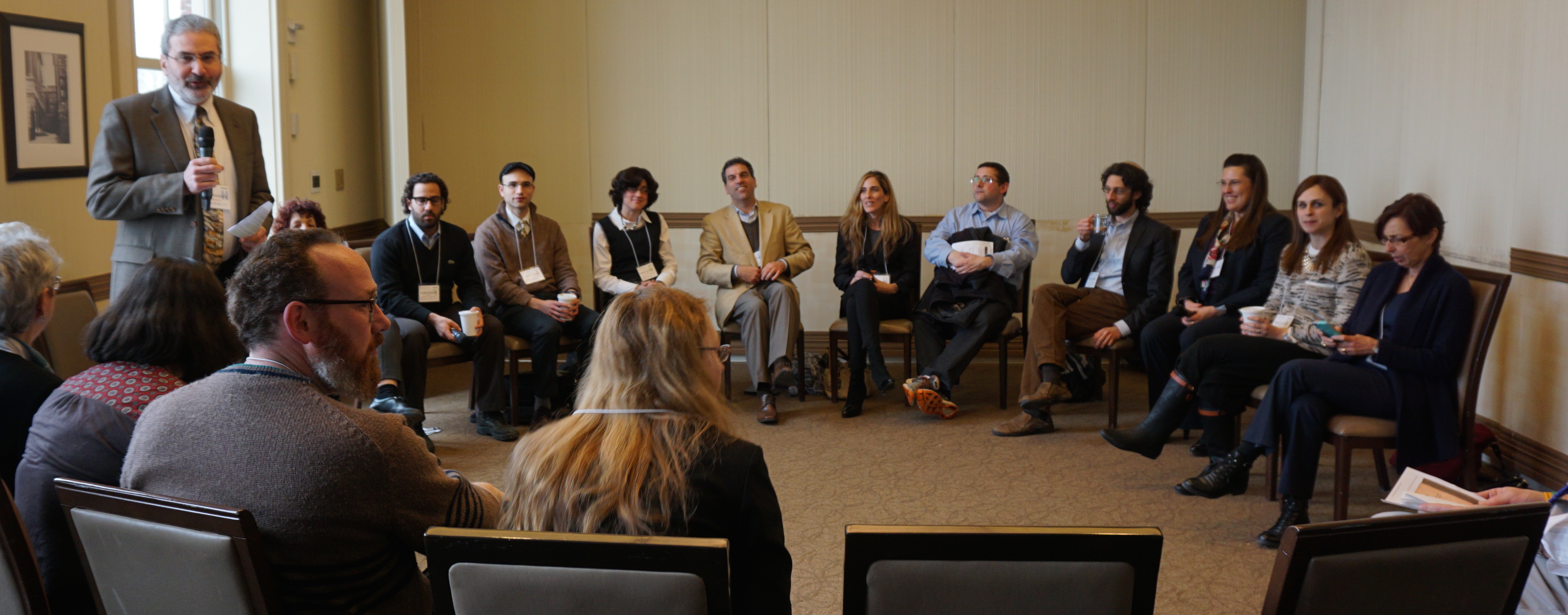Two-Year Faculty Development Program Represents a Microcosm of CCNMTL’s Work at Columbia
March 17th, 2015
Maurice Matiz is Director of the Columbia Center for New Media Teaching and Learning (CCNMTL). This blog originally appeared on the CCNMTL website.
Last week, CCNMTL reached two important milestones: the center completed its 15th year of operations, and the eLearning Faculty Fellowship (eLFF) concluded its two-year run. The appreciative smiles on the part of the eLFF faculty fellows reminded me how much that program represents a microcosm of CCNMTL’s 15 years.
The eLFF program provided year-long support for two sets of faculty fellows selected from three participating schools (Jewish Theological Seminary, Yeshiva University, and Hebrew Union-Jewish Institute of Religion). It was made possible because of our existing successful partnership withJTS and support from the Jim Joseph Foundation.
 A cohort conversation to discuss program implications for each institution.
A cohort conversation to discuss program implications for each institution.Faculty participating in the eLFF program—mostly self-selected, though a few were nominated—sought exposure to educational technologies that they felt could help them become more effective teachers. This is similar to how and why Columbia faculty have approached CCNMTL over the years. There is a yearning to understand the fast-moving technology front, and one sure way is to seek assistance from experts who are also willing guides, such as our educational technologists (ETs). The field is highly dynamic, and it can be difficult to sort through dozens of tools and platforms without such guidance.
Faculty in the eLFF program started out unsure and lacking confidence in their grasp of new technologies. Similarly, over the years we have encountered many Columbia faculty who are wary of their own abilities to master any classroom technology beyond the chalkboard. CCNMTL staff become therapists of a kind, boosting instructors’ confidence and believing in their ability to learn new technologies and incorporate them into their pedagogy. Our ETs use many tactics, including starting small, or encouraging more time-on-task, knowing that familiarity will overcome uncertainty. Our ETs also understand that teaching is a performance, which can breed anxieties of its own, and that the technology experimentation can lead to more exposure—additional time “on stage” and more opportunities to miss a cue.
 Faculty fellows describe their experience with technology in the classroom.
Faculty fellows describe their experience with technology in the classroom.At the eLFF symposiums, held after each year’s program, the faculty spoke expertly and with confidence, demonstrating how they’ve integrated video lectures, collaborative editing tools, presentation tools that go beyond the staid PowerPoint, and other cutting-edge technologies into their classroom and curriculum. We saw faculty learn how to evaluate new tools and new technologies. We saw caring educators, investing time and energy in media and educational activities that help students learn more effectively. For the CCNMTL staff, seeing that transformation was quite rewarding, and echoes much of what we have experienced over the years working with Columbia faculty.
A select few in the eLFF program came with some prior experience or jumped in with such earnest enthusiasm that they immediately pulled ahead of their less experienced colleagues. For these technophiles, the program became fertile ground to develop a latent interest or capability. Likewise, over the years, a few pioneering Columbia faculty have proudly showcased possibilities and innovations in the classroom. This important subgroup leads to rapid results that help to inspire others.
The eLFF was at its heart a faculty development effort, and I applaud the three schools for taking steps to provide strong support for their faculty, allowing them to explore and experiment with their teaching methods. Each of the three schools’ administration aims to create a sustainable educational technology support group, much like Columbia did with CCNMTL 15 years ago. The eLFF program certainly gives them excellent results to build on, and vocal faculty advocates to lead the way.
The eLFF program was a collaboration with Deborah Miller and Debbie Kerschner from JTS, Rob Weinberg and Gregg Alpert from Hebrew Union College – Jewish Institute of Religion, and Allison Rubin and Judith Cahn from Yeshiva University. At CCNMTL, the program was led by Dan Beeby, Kenny Hirschmann, and Ellen Maleszewski.